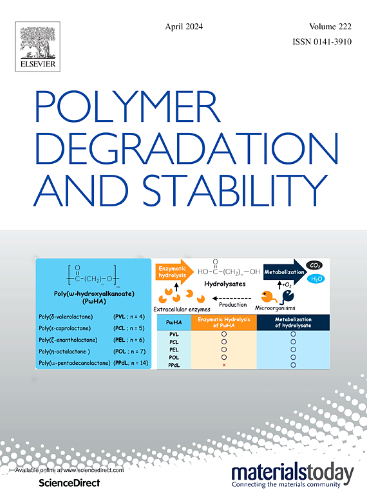掺杂钴离子的植酸三聚氰胺与可膨胀石墨协同作用可高效阻燃聚丙烯
IF 6.3
2区 化学
Q1 POLYMER SCIENCE
引用次数: 0
摘要
在阻燃聚丙烯(PP)中保持阻燃性和可膨胀石墨(EG)含量之间的微妙平衡仍然是一项艰巨的挑战,这主要是由于 EG 的阻燃效率较低。为了解决这一问题,研究人员利用植酸(PA)和三聚氰胺(MA),通过水热法制备了一种新型掺钴纳米片状阻燃剂(PAMA-Co),在构建协同 EG 阻燃聚丙烯方面展现出了良好的潜力。值得注意的是,仅添加 7 wt% 的 PAMA-Co/23 wt% 的 EG 体系就能将 PP 的极限氧指数(LOI)提高到 27.3%,达到 UL-94 V0 水平,这表明 PAMA-Co 具有优异的协同阻燃性能。此外,含有 7 wt% PAMA-Co/23 wt% EG 的 PP 复合材料的峰值热释放率(PHRR)和峰值烟雾产生率(PSPR)都大幅降低,与纯 PP 相比,PHRR 降低了 81.6%,PSPR 降低了 87.8%。出色的阻燃效率归功于以下机理:气相稀释、催化交联炭化效应以及抑制 PAMA-Co 的 EG "爆米花效应"。总之,这项工作不仅加深了人们对阻燃机理的理解,还为提高聚丙烯在各种应用中的安全性和实用性提供了一种实用的绿色策略。本文章由计算机程序翻译,如有差异,请以英文原文为准。
Efficient flame retardancy of polypropylene by cobalt ions doped phytate melamine synergized with expandable graphite
Maintaining a delicate balance between flame retardancy and amount of expandable graphite (EG) in flame retardant polypropylene (PP) is still a formidable challenge, primarily due to the lower flame-retardant efficiency of EG. In order to address this concern, a novel cobalt-doped nanosheet flame retardant (PAMA-Co) was fabricated by a hydrothermal method utilizing phytic acid (PA) and melamine (MA), exhibiting a promising potential in constructing synergistic EG flame retardant PP. Significantly, the incorporation of only 7 wt% PAMA-Co/23 wt% EG system raises the limiting oxygen index (LOI) of PP to 27.3% and UL-94 V0 level, which indicates the excellent synergistic flame-retardant efficiency of PAMA-Co. Furthermore, both the peak heat release rate (PHRR) and the peak smoke production rate (PSPR) of PP composites with 7 wt% PAMA-Co/23 wt% EG are substantially reduced, exhibiting an 81.6% lower PHRR and 87.8% PSPR compared to pure PP. The excellent flame-retardant efficiency is attributed to the following mechanisms: Gas-phase dilution, catalytic cross-linking charring effect, and the suppression of the EG “popcorn effect” of PAMA-Co. In summary, this work not only advances an understanding of flame-retardant mechanisms but also offers a practical, green strategy for enhancing the safety and utility of PP in various applications.
求助全文
通过发布文献求助,成功后即可免费获取论文全文。
去求助
来源期刊

Polymer Degradation and Stability
化学-高分子科学
CiteScore
10.10
自引率
10.20%
发文量
325
审稿时长
23 days
期刊介绍:
Polymer Degradation and Stability deals with the degradation reactions and their control which are a major preoccupation of practitioners of the many and diverse aspects of modern polymer technology.
Deteriorative reactions occur during processing, when polymers are subjected to heat, oxygen and mechanical stress, and during the useful life of the materials when oxygen and sunlight are the most important degradative agencies. In more specialised applications, degradation may be induced by high energy radiation, ozone, atmospheric pollutants, mechanical stress, biological action, hydrolysis and many other influences. The mechanisms of these reactions and stabilisation processes must be understood if the technology and application of polymers are to continue to advance. The reporting of investigations of this kind is therefore a major function of this journal.
However there are also new developments in polymer technology in which degradation processes find positive applications. For example, photodegradable plastics are now available, the recycling of polymeric products will become increasingly important, degradation and combustion studies are involved in the definition of the fire hazards which are associated with polymeric materials and the microelectronics industry is vitally dependent upon polymer degradation in the manufacture of its circuitry. Polymer properties may also be improved by processes like curing and grafting, the chemistry of which can be closely related to that which causes physical deterioration in other circumstances.
 求助内容:
求助内容: 应助结果提醒方式:
应助结果提醒方式:


